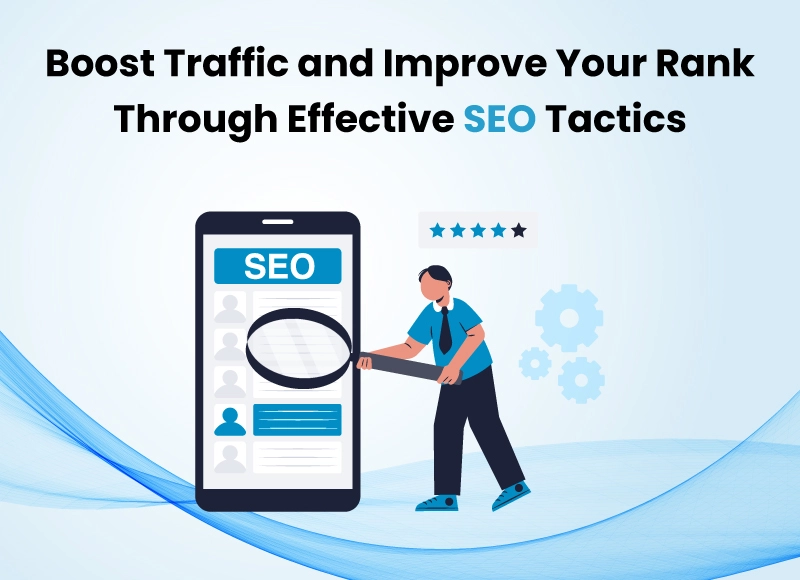Table of Contents
Increase website traffic and enhance search engine ranking with proven and efficient SEO strategies.

Having a website on the internet is one thing, but making sure it gets seen by search engines and potential customers is another. Search Engine Optimization (SEO) can help your website rank higher in search engine results pages (SERPs), giving you an edge over competitors and increasing visibility for your business. SEO involves optimizing content, structure, and links to improve search engine rankings and overall performance.
With the right SEO strategy in place, you can ensure that more people are seeing your website – boosting sales leads, conversions, brand awareness, and more. This article will discuss the importance of SEO for websites and how to use it to get your page ranking on Google or other search engines.
Introducing Search Engine Optimization (SEO)
Search Engine Optimization (SEO) is an important part of website development and search engine rankings. It involves optimizing content, structure, and links to improve rankings of search engine results pages (SERPs). SEO works by optimizing the search engine algorithms used to rank web pages in search engine results. By improving the way search engines find and index webpages, SEO can help websites rank higher in search engine results pages.
The Importance of SEO for Your Website
SEO helps search engines understand your website and how it should be classified and ranked in search engine results pages. This can include ensuring titles, meta description tags, headers, and other elements are optimized for search engines and setting up internal links that direct users to relevant content across the website. SEO also involves using keywords throughout your content to give it more relevance in search results.
Website Visibility
SEO aims to increase website visibility for specific target keywords to obtain more organic traffic from search engines. To achieve this goal, web developers must ensure their websites are properly optimized for search engine algorithms and prioritize their efforts around a set of targeted keywords they wish to rank for on SERPs.
In specific industries like travel, it's crucial to understand the nuances that come with targeted optimization. For instance, SEO for tour operators requires a specialized approach. Tour operators deal with a niche audience looking for specific travel experiences. This means that the keywords, content, and optimization strategies they employ might differ from those of a generic business.
Rank on the First Page
When done correctly, SEO can help websites achieve higher rankings on SERPs, resulting in improved visibility and more organic traffic. Additionally, having a good SEO strategy can also help increase conversions since users searching on Google or other search engines may be more likely to click on a website if it appears closer to the top of the list rather than lower down on page two or further back in SERP results pages.
How Search Engine Algorithms Works
Search engine algorithms are the mathematical formulas search engines use to rank websites in search engine results pages (SERPs). Algorithms analyze a multitude of elements and signals on a website and its content to determine how relevant it is to search queries. These algorithms are constantly changing and evolving, but they all rely on a few fundamental principles that search engines use to process search queries.
Crawling
One of the core components of search engine algorithms is 'crawling' or indexing web pages. This involves search engines using bots or web crawlers to traverse through websites looking for relevant information. The bots collect data from each webpage, such as text, images, links, etc., which is then stored in search engine databases for later retrieval.
Content Relevancy
Another important component of search engine algorithms is analyzing content relevancy. This involves understanding the context of webpages based on their content, titles, tags, meta descriptions, and other elements found on them. Search engines use this data to identify what topics the webpages discuss and if those topics relate to search query terms entered into the search bar by users.
Link Analysis
Link analysis is also an important part of search engine algorithms. In this process, search engines look at how many external website links are on the given page and the quality of those links. The idea behind this concept is that if other reputable websites are linking back to yours, your website must be considered important and ranked higher in SERP results pages than lesser-known ones without any external links pointing back to them.
User Interaction
Finally, search engine algorithms consider user behaviour when ranking web pages in SERPs. For example, suppose a user clicks on your website more often than others after entering specific search query terms into the search bar or stays on your page longer than average before leaving again. In that case, it indicates that your webpage was deemed more relevant than others for that particular topic – resulting in higher rankings in SERPs over time.
Steps to Optimize Content for Search Engines
The first step to optimizing content for search engines is to understand what types of content your target audience is looking for. This means researching relevant keywords, understanding search intentions, and analyzing competitor content. Once you have gathered all the necessary information, you can create informative and engaging content while targeting specific keywords throughout the text. Additionally, adding internal links to other pages on your website can help boost SEO by increasing the number of clicks a user makes when navigating through your website.
Index Structure
In addition to optimizing content for search engine crawlers, it's also essential to structure your website to make it easy for search engines to index and understand its contents. This includes ensuring proper HTML tags are used when constructing titles, subtitles, headings, and paragraph tags; using ALT descriptions and image tags; using proper link structures; using schema markups; and working with new technologies such as Accelerated Mobile Pages (AMP). All these elements combined together make it easier for search engine bots to read webpages and identify their relevance towards certain search queries – resulting in higher rankings in SERPs.
Link Optimization
Finally, link optimization is also an important component of SEO. Search engine algorithms analyze external links pointing back to a given page when determining relevance towards specific topics or queries entered into the search bar by users. Therefore, building quality backlinks from reliable sources helps indicate trustworthiness towards a given webpage, contributing to higher rankings in SERPs over time. Additionally, linking internally across different pages on your website helps pass on 'link juice' – boosting overall rankings on search results pages as well!
Pro tip: You can use various tools to analyze and optimize your links. This tools have all the necessary functions to check outbound links, inbound links and internal links.
How to Get Your Page Ranking on Google
First and foremost, you must ensure your business is listed in the Google My Business directory. This will allow potential customers to search for your business by name or location. Once customers find your business, they can view key information such as contact details, hours of operation, website address, and even ratings from previous customers – making it easier for them to make an informed decision about visiting or interacting with your business! Additionally, optimizing content around local keywords can help increase the chances of appearing highly ranked in SERPs – especially if those queries include locations or nearby areas!
Optimize Keywords
Next, you need to optimize your content so that the search engines can better understand what services and products you offer. This means researching relevant keywords using tools such as Google Trends or Keyword Planner and incorporating them into titles and headings throughout the content on your website. You can also work with specialists such as the ones from Perth SEO Studio to help you find and incorporate the right keywords into your content. Additionally, adding internal links between different pages on your website helps search engine bots crawl through the various elements faster and easier – resulting in higher rankings over time!
Link Building
Link building is another important component of search engine optimization. Implementing a successful link-building campaign is crucial for enhancing SEO efforts, as it significantly contributes to the authority and visibility of your website in search engine results. Building quality backlinks from other websites with high domain authority helps search engines understand which web pages are more relevant than others for that particular topic – resulting in higher rankings in SERPs over time. To streamline this process, consider becoming part of a link building community where you can network, share strategies, and discover opportunities for building high-quality backlinks more efficiently.This can be achieved through guest blogging (writing blog posts for other websites), outreach (asking industry professionals for backlinks), or even guest commenting (leaving comments on other blogs with a link back to yours).
Monitoring Search Engine Rankings and Performance Over Time
Monitoring search engine rankings and performance over time is essential to know if the search engine optimization (SEO) efforts are effective. Tracking search engine rankings involves observing how well your website ranks for certain keywords or phrases in search engine results pages (SERPs). This helps you determine which elements of your SEO strategy are working and identify areas that need improvement.
Use Keyword Tracking Tools
One way to monitor search engine rankings and performance is through keyword tracking tools. These tools provide detailed information about a website's ranking on search engines such as Google, Bing, and Yahoo. They allow users to track specific keyword phrases at any given time to see if their website appears higher on search engine results pages. Additionally, keyword tracking tools provide data on a website's click-through rate (CTR), indicating how many people click on the search result link and visit the page.
Utilize Google Analytics
Another way to track search engine rankings is by using web analytics tools such as Google Analytics or Adobe Analytics. These tools allow users to view real-time data such as visitors' geographic location, device type, and even average session duration – providing key insights into how well your website performs in search engine rankings. Additionally, some analytics programs also offer features such as conversion tracking, which allows users to measure the success of their SEO efforts by tracking actual sales or leads generated from organic search traffic.
Increase Your Domain Authority
Lastly, one of the most important measures of SEO performance is "domain authority" – this score indicates how trustworthy a website appears to search engines like Google or Bing. It considers factors such as backlinks from other websites, the number of indexed web pages, and overall content quality – all key components contributing to higher search engine rankings over time. By monitoring domain authority & other metrics regularly, you can easily identify areas that need more attention when improving SEO visibility for your website!
Conclusion
Overall, Search Engine Optimization (SEO) is an important part of any website development strategy. It can help improve visibility and generate more organic traffic from search engines such as Google or other search engines. By taking the time to understand how search engine algorithms work and designing effective strategies around them, business owners can ensure their websites are properly optimized for maximum success online – boosting sales leads, conversions, brand awareness, and more!






